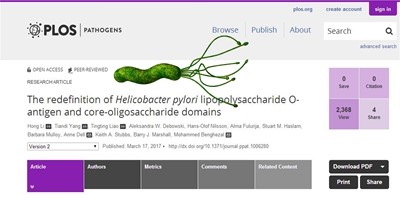
PLOS Pathogensrecently published an important scientific paper titled "The Redefinition of Helicobacter pylori Lipopolysaccharide O-antigen and Core-oligosaccharide Domains". Dr. Hong Li, the first author of this paper, is from the international collaboration center: "West China-Marshall Research Centre for Infectious Diseases", Center of Infectious Diseases, West China Hospital of Sichuan University. This novel study represents an outstanding achievement of the academic collaboration between Sichuan University and The University of Western Australia (UWA).
H. pylori, discovered by UWA Professor Barry Marshall and Emeritus Professor Robin Warren, chronically infects the human stomach and causes ulcers and gastric cancer. Professors Marshall and Warren were awarded the 2005 Nobel Prize in Physiology or Medicine for the “discovery of the bacterium H. pylori and its role in gastritis and peptic ulcer disease”.
Lipopolysaccharide (LPS), an important biomolecule that "covers the surface of the bacterium like a shield and has unique properties compared to most other bacteria in that the molecule promotes lifelong infection by helping the bacterium evade the host’s natural immune system". H. pylori LPS is structurally composed of three domains: 1) the hydrophobic lipid A (or endotoxin); 2) the core-oligosaccharide domain; and 3) the O-antigen domain. Previous studies suggested H. pylori core-oligosaccharide domain comprised of the canonical outer core and inner core. However, prior to this study, the structure and biological functions of the H. pylori core-oligosaccharide domain remained unclear. Using a combination of mass spectrometry and NMR spectroscopy, Dr. Hong Li et al. redefined the core-oligosaccharide domain of H. pylori LPS to comprise solely the inner core conserved hexasaccharide of the previous model. Furthermore, theputative heptosyltransferase HP1284 wasfound to be required for the transfer of the third heptose residue to the core-oligosaccharide. Mutant deficient in HP1284 was unable to colonise the mouse gastric mucosa. Given the unique H. pylori LPS is a key determinant for establishing colonisation and persistence, elucidating the complete H. pylori LPS structure and its biosynthetic pathway represent an important step towards the development of novel anti-H. pylori drugs targeting the LPS biosynthesis.
"West China-Marshall Research Centre for Infectious Diseases" was established by West China Hospital and UWA on June 25th, 2015. Professor Hong Tang from West China Hospital, and Professor Barry Marshal from UWA are the coordinators. Since its establishment, this collaboration center has received great attention and support from Chengdu municipal government and Australian government. The collaboration center is proudly to be visited by delegation led by the former Australian Consul-general in Chengdu Ms Nancy Gordon in 2015, and subsequently visited by delegation led by Australia’s Ambassador to the P. R. China H.E Ms Jan Adams in 2016. "West China-Marshall Research Centre for Infectious Diseases" will continue to serve as the collaboration platform between West China Hospital and UWA to further strengthen bilateral academic exchange.
(http://journals.plos.org/plospathogens/article?id=10.1371/journal.ppat.1006280)


